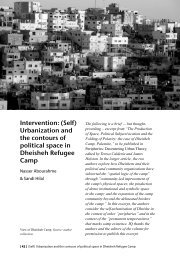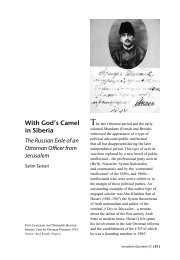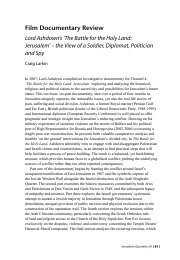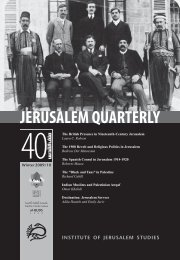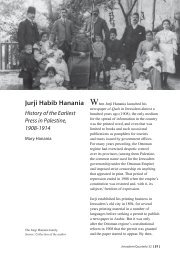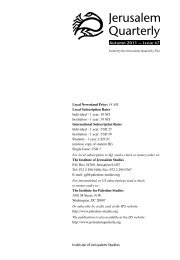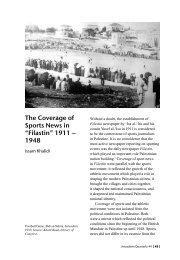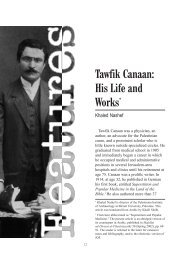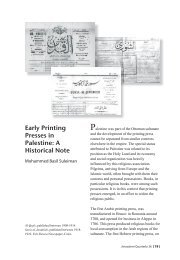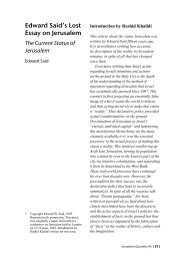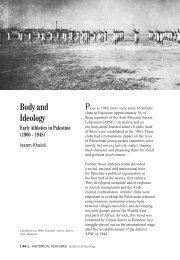INSTITUTE OF JERUSALEM STUDIES - Jerusalem Quarterly
INSTITUTE OF JERUSALEM STUDIES - Jerusalem Quarterly
INSTITUTE OF JERUSALEM STUDIES - Jerusalem Quarterly
Create successful ePaper yourself
Turn your PDF publications into a flip-book with our unique Google optimized e-Paper software.
no doubt that both families’ lineage was among the ashraaf despite being different<br />
ancestral lines. It is thus useful to present al-Zubaydi’s research, garnered when he<br />
visited their homes in <strong>Jerusalem</strong>, staying as their guest.<br />
Al-Zubaydi mentioned Abdel Latif bin Abdullah, who inherited the ashraaf syndicate<br />
from his cousins via the branch of Muhibbeddin of the Ghadiya family in 1158 H/1745<br />
CE. He noted the lineage of Abdel Latif, who was named after his grandfather Abdel<br />
Latif bin Abdel Qader bin Abdel Rahman bin Musa bin Abdel Qader bin Musa bin ‘Ali<br />
bin Shemseddin Muhammad Ghadiya al-Aswadi al-Maqdadi al-Maqdasi. Al-Zubaydi<br />
further added to his description of Abdel Latif (father of <strong>Jerusalem</strong>’s mufti and author<br />
of biographies of <strong>Jerusalem</strong>’s residents) that he was “head of the sayyids (ashraaf),<br />
the grandson of the al-Hassan family, and a famous generous individual”. Al-Zubaydi<br />
had heard of him when he was in Medina in 1163 H/1750 CE and yearned to meet<br />
him. When al-Zubaydi reached Egypt, he traveled to Mansoura and then Damietta,<br />
and from there traveled by sea to Jaffa. When he reached the home of the naqib of<br />
<strong>Jerusalem</strong>’s ashraaf, he and his children were generous with him and paid him the<br />
utmost interest. He added in his description of the naqib of <strong>Jerusalem</strong>’s ashraaf that<br />
he had “a decent and reverent heart. Everyone visits him from near and afar. Strangers<br />
find refuge in his home, residing there as they like, respectable as though in their own<br />
homes.”<br />
When Emir al-Haj came to collect taxes from the district and its residents, he stayed in<br />
his home for a few days. When he left, “he was presented with luxurious gifts suitable<br />
for him,” reported al-Zubaydi, who stayed in the home of the naqib of <strong>Jerusalem</strong>’s<br />
ashraaf for 19 days. When he left, a group of Abdel Latif’s men escorted him on<br />
horseback “until we reached Ramla. He ordered me to stay in the home of their<br />
relative, Taj al-Huda, and so I stayed in their home, respected and blessed.” When al-<br />
Zubaydi arrived in Egypt, their relationship was sustained through correspondence and<br />
“gifts and greetings” sent by the naqib of <strong>Jerusalem</strong>’s ashraaf to this eminent scholar.<br />
The author closes his biography of Abdel Latif by saying that “he passed away on the<br />
third of Dhu al-Qaeda 1188 H., at the approximate age of 90.”<br />
Hassan Abdel Latif, biographer of <strong>Jerusalem</strong>’s residents, also recorded the life of his<br />
own father and mentioned that Muhammad Murtada al-Yamani, “orator of the age and<br />
intellectual of the period and time” had also written his father’s biography. Yet Hassan<br />
Abdel Latif’s biographies of his father and great-grandfather Abdel Latif bin Abdel<br />
Qader, “shaykh of al-Haram al-Sherif and naqib of the ashraaf of its pure surrounds”<br />
who died in 1107 H/1695-1696 CE, did not mention the lineage of the family<br />
mentioned by al-Zubaydi, that of the Ghadiya al-Aswadi al-Maqdadi family. Likewise,<br />
Khalil al-Muradi, the mufti of Damascus and author of A Chain of Pearls, did not<br />
mention this important fact about the lineage of Abdel Latif bin Abdel Qader in his<br />
biography of him. Yet Hassan Abdel Latif’s biography of his father is not completely<br />
free of reference to the lineage described by Murtada al-Zubaydi. A poem by Shaykh<br />
<strong>Jerusalem</strong> <strong>Quarterly</strong> 32 [ 15 ]


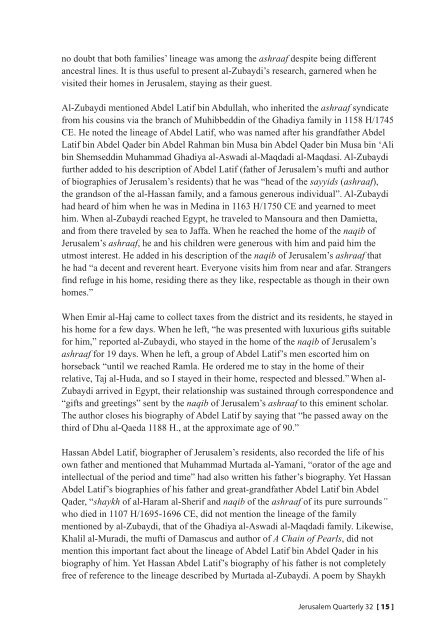
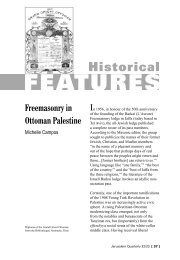
![In Search of Jerusalem Airport [pdf] - Jerusalem Quarterly](https://img.yumpu.com/49007736/1/180x260/in-search-of-jerusalem-airport-pdf-jerusalem-quarterly.jpg?quality=85)
